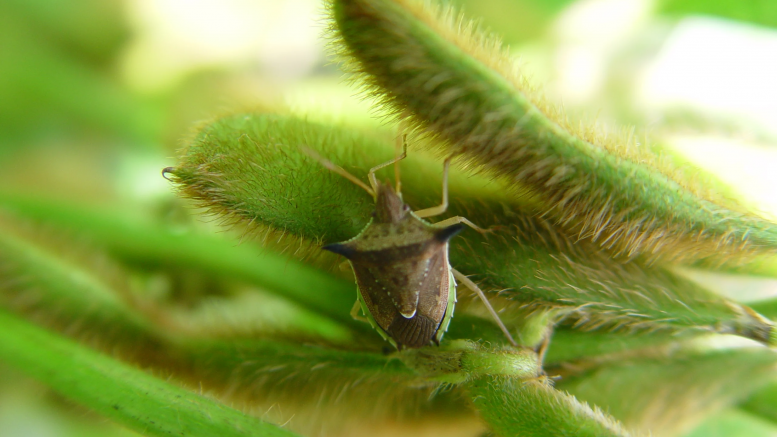“RNA can be used to inactivate specific genes in insect pests, pathogens and weeds, protecting crops of agricultural importance…”
Hugo Molinari is the director of research, development and innovation at Sempre Agtech/WIN, former researcher at Embrapa Agroenergia, and specialist in biotechnology at CTNBio. Molinari is an agronomist and holds a master’s degree in genetics and molecular biology from the State University of Londrina, with a doctorate in agronomy from the Federal University of Paraná.
Sempre AgTech is a Brazilian company based in Chapecó, State of Santa Catarina, that operates in the genetic improvement of plants and creation of new biotechnologies. The company is developing a new technology, called bio-targeted pesticide, to fight brown stink bugs (Euschistus heros) and green-belly stink bugs (Diceraeus melacanthus), pests that attack soybean and corn crops.

Hugo Molinari, director at Sempre Agtech/WIN
AgriBrasilis – What are genomic editing tools? How can they contribute to agricultural productivity?
Hugo Molinari – Genomic editing tools allow the manipulation of the DNA of living organisms in a precise and specific way. This can contribute to improving yields, as well as allowing the development of plants with desirable characteristics, such as resistance to pests, tolerance to environmental conditions and greater nutritional value. An example of these tools is CRISPR/Cas.
AgriBrasilis – Do you consider that transgenic crops will lose space in the market after the advent of genomic editing? Why?
Hugo Molinari – Genomic editing can lead to a lower use of transgenics, as it offers greater precision and control over genetic alterations. However, it is difficult to predict whether transgenics will completely lose ground, as both methods have their advantages and disadvantages.
A very favorable point for genomic editing is the possibility of creating organisms that can be considered as conventional (non-transgenic), thus saving millions of dollars, avoiding the regulatory process to which transgenics are submitted.
AgriBrasilis – What are “bio-targeted pesticides” and how are they developed? How much time and money is necessary to develop these products?
Hugo Molinari – Bio-targeted pesticides are biological products that target specific organisms, reducing environmental impacts and resistance to agrochemicals. They are being developed through long-term research, involving multidisciplinary knowledge.
Sempre AgTech/WIN’s bio-targeted pesticide products, for example, have dsRNA (double-stranded RNA) as their active ingredients, that bind to specific sequences of genes that are meant to be inactivated.
Costs and development time vary, but are generally less than traditional chemical pesticides. In addition, they are formulated with “ecofriendly” characteristics, as they do not affect humans, animals, pollinators or the environment.
RNA (ribonucleic acid) is an essential molecule for life, acting in the process of gene expression. In agriculture, RNA can be used to inactivate specific genes in insect pests, pathogens and weeds, protecting crops of agricultural importance. There are still no commercial products based on RNA in the world.
AgriBrasilis – When will these products be available on the market, intended for which crops?
Hugo Molinari – We expect to make these products available on the market in at least 3 years.
AgriBrasilis – Is it possible to scale the production of bio-targeted pesticides?
Hugo Molinari – Production of bio-targeted pesticides can be scaled up, but viability depends on the molecules’ resistance to degradation, and that is not something trivial. Research efforts are under way to overcome this challenge.
We rely on our partners to develop the best strategy to protect and produce our formulations on a large scale with affordable and competitive costs for the agribusiness sector.
AgriBrasilis – What other researches and innovations are being developed by Sempre AgTech? What are the partnerships with public and private institutions?
Hugo Molinari – Sempre AgTech/WIN is investing in several areas of research and development. Highlights include genomic editing of elite corn lineages for the development of hybrids with greater efficiency in the use of nitrogen, genomic editing of microorganisms to increase biological nitrogen fixation in corn plants, genetic transformation and the use of interfering RNA for topical use to control insects and diseases of economic importance, assisted selection via molecular markers for early identification of characteristics of agronomic interest in the corn genetic improvement program, and the development of nanoformulations for agriculture 4.0.
The company is collaborating with several public and private institutions, including Yosen Nanotechnology, a Brazilian company specialized in the development of products that unite nanotechnology and lipid delivery systems, in addition to decentralized units of Embrapa.
READ MORE:
It’s a Matter of Time for a Unicorn AgTech to Appear in Brazil

